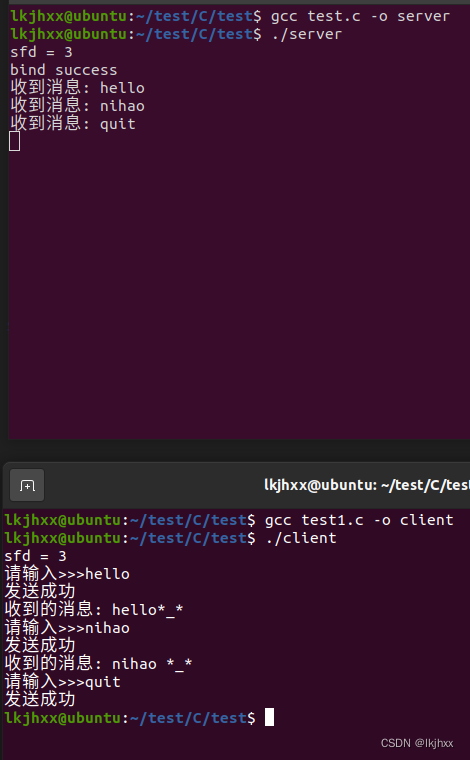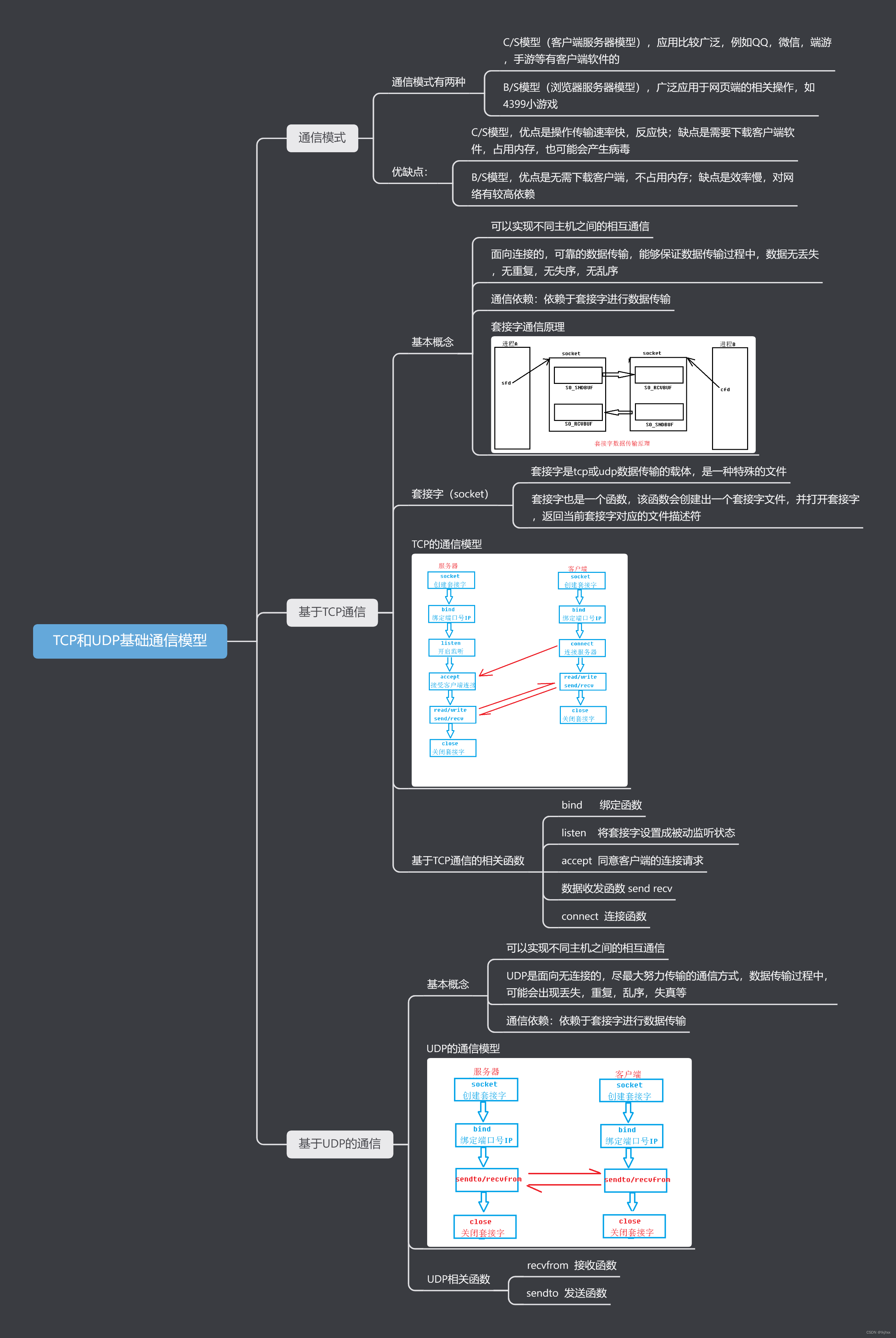2024.02.29作业
1. TCP模型
server
#include "test.h"
#define SER_IP "192.168.191.128"
#define SER_PORT 9999
int main(int argc, char const *argv[])
{
int sfd = -1;
sfd = socket(AF_INET, SOCK_STREAM, 0);
if (-1 == sfd)
{
perror("socket error");
return -1;
}
printf("sfd = %d\n", sfd);
struct sockaddr_in sin;
sin.sin_family = AF_INET;
sin.sin_port = htons(SER_PORT);
sin.sin_addr.s_addr = inet_addr(SER_IP);
if (bind(sfd, (struct sockaddr*)&sin, sizeof(sin)) == -1)
{
perror("bind error");
return -1;
}
if (listen(sfd, 128) == -1)
{
perror("listen error");
return -1;
}
struct sockaddr_in cin;
socklen_t socklen = sizeof(cin);
int newfd = accept(sfd, (struct sockaddr*)&cin, &socklen);
if (newfd == -1)
{
perror("accept error");
return -1;
}
printf("newfd = %d\n", newfd);
printf("IP: %s, port: %d\n", inet_ntoa(cin.sin_addr), ntohs(cin.sin_port));
char rbuf[128] = "";
while (1)
{
bzero(rbuf, sizeof(rbuf));
int res = read(newfd, rbuf, sizeof(rbuf));
if (res == 0)
{
printf("客户端下线\n");
break;
}
printf("[%s:%d] : %s\n", inet_ntoa(cin.sin_addr), ntohs(cin.sin_port), rbuf);
strcat(rbuf, "*_*");
write(newfd, rbuf, strlen(rbuf));
}
close(sfd);
close(newfd);
return 0;
}client
#include "test.h"
#define SER_IP "192.168.191.128"
#define SER_PORT 9999
int main(int argc, char const *argv[])
{
int sfd = -1;
sfd = socket(AF_INET, SOCK_STREAM, 0);
if (-1 == sfd)
{
perror("socket error");
return -1;
}
printf("sfd = %d\n", sfd);
struct sockaddr_in sin;
sin.sin_family = AF_INET;
sin.sin_port = htons(SER_PORT);
sin.sin_addr.s_addr = inet_addr(SER_IP);
if (connect(sfd, (struct sockaddr*)&sin, sizeof(sin)) == -1)
{
perror("connect error");
return -1;
}
char wbuf[128] = "";
while (1)
{
bzero(wbuf, sizeof(wbuf));
printf("请输入>>>");
fgets(wbuf, sizeof(wbuf), stdin);
wbuf[strlen(wbuf) - 1] = 0;
send(sfd, wbuf, strlen(wbuf), 0);
printf("发送成功\n");
if (strcmp(wbuf, "quit") == 0)
{
break;
}
bzero(wbuf, sizeof(wbuf));
recv(sfd, wbuf, sizeof(wbuf), 0);
printf("收到的消息: %s\n", wbuf);
}
close(sfd);
return 0;
}
2. UDP模型
server
#include "test.h"
#define SER_IP "192.168.191.128"
#define SER_PORT 9999
int main(int argc, char const *argv[])
{
int sfd = -1;
sfd = socket(AF_INET, SOCK_DGRAM, 0);
if (-1 == sfd)
{
perror("socket error");
return -1;
}
printf("sfd = %d\n", sfd);
struct sockaddr_in sin;
sin.sin_family = AF_INET;
sin.sin_port = htons(SER_PORT);
sin.sin_addr.s_addr = inet_addr(SER_IP);
if (bind(sfd, (struct sockaddr*)&sin, sizeof(sin)) == -1)
{
perror("bind error");
return -1;
}
printf("bind success\n");
struct sockaddr_in cin;
socklen_t socklen = sizeof(cin);
char rbuf[128] = "";
while (1)
{
bzero(rbuf, sizeof(rbuf));
recvfrom(sfd, rbuf, sizeof(rbuf), 0, (struct sockaddr*)&cin, &socklen);
printf("收到消息: %s\n", rbuf);
strcat(rbuf, "*_*");
if (sendto(sfd, rbuf, sizeof(rbuf), 0, (struct sockaddr*)&cin, socklen) == -1)
{
perror("sendto error");
return -1;
}
}
close(sfd);
return 0;
}client
#include "test.h"
#define SER_IP "192.168.191.128"
#define SER_PORT 9999
int main(int argc, char const *argv[])
{
int sfd = -1;
sfd = socket(AF_INET, SOCK_DGRAM, 0);
if (-1 == sfd)
{
perror("socket error");
return -1;
}
printf("sfd = %d\n", sfd);
struct sockaddr_in sin;
sin.sin_family = AF_INET;
sin.sin_port = htons(SER_PORT);
sin.sin_addr.s_addr = inet_addr(SER_IP);
char wbuf[128] = "";
while (1)
{
bzero(wbuf, sizeof(wbuf));
printf("请输入>>>");
fgets(wbuf, sizeof(wbuf), stdin);
wbuf[strlen(wbuf) - 1] = 0;
sendto(sfd, wbuf, strlen(wbuf), 0, (struct sockaddr*)&sin, sizeof(sin));
printf("发送成功\n");
if (strcmp(wbuf, "quit") == 0)
{
break;
}
bzero(wbuf, sizeof(wbuf));
recvfrom(sfd, wbuf, sizeof(wbuf), 0, NULL, NULL);
printf("收到的消息: %s\n", wbuf);
}
close(sfd);
return 0;
}
思维导图

原文地址:https://blog.csdn.net/lkjhxx/article/details/136384121
免责声明:本站文章内容转载自网络资源,如本站内容侵犯了原著者的合法权益,可联系本站删除。更多内容请关注自学内容网(zxcms.com)!
